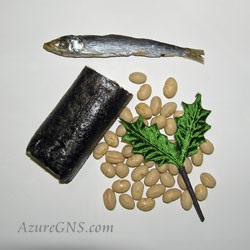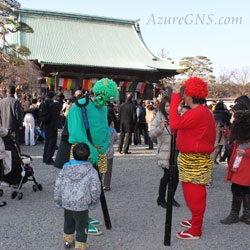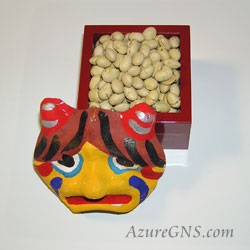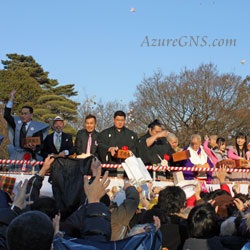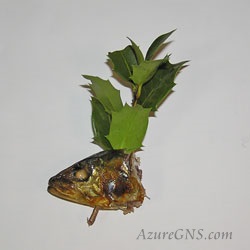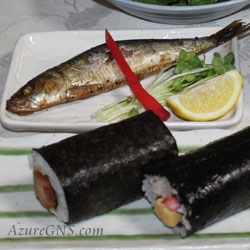(2月3日又は4日)
Setsubun
The Bean-Throwing Ceremony;
(February 3rd or 4th)
●節分 Setsubun; Bean-throwing Ceremony; Bean-scattering Ceremony;
Bean-throwing Festival; Bean-scattering Festival
●福豆 lucky roasted soybeans
●炒り豆 roasted soybeans
●鬼 demon; devil
●お面 mask
●神社 shrine
●寺 temple
●幸運 good luck
●悪運 bad luck
●柊 holly
●鰯 sardine
●巻寿司 maki-zushi; rolled sushi
◆日本の旧暦によると、春夏秋冬、各季節の始まりの日を立春、立夏、立秋、立冬と呼びます。
According to the old lunar calendar of Japan, the day when each season starts is designated as Risshun (spring), Rikka (summer), Risshu (autumn) and Ritto (winter).
◆節分は文字通り「季節の分かれ目」という意味で、これらの4つの日の前日を意味しました。
Setsubun literally signifies “the division of each season” and originally meant the day before these four days.
◆しかし最近は節分といえば2月3日か4日の豆まきをする節分のこととなりました。
However, now when people hear Setsubun, they think only of the Bean-throwing Ceremony which falls on either the 3rd or the 4th of February.
◆「鬼は外、福は内」と大きな声で言いながら、「福豆」と呼ばれる炒った大豆を家の中や外にまきます。
People throw roasted soybeans called “Fuku-mame” (lucky beans) inside and outside the house shouting “Oni wa soto! Fuku wa uchi!”
◆それは「悪運は外へ!幸運は内へ!」という意味です。
This means, “Out with bad luck! In with good luck!”
◆特に子供達が豆まきを楽しみ、家庭、保育園、幼稚園などで豆まきが行われます。
Children especially enjoy throwing beans at home, nursery schools and kindergartens.
◆しばしば親や先生が鬼の役をしてお面をかぶり、子供達に豆をぶつけられます。
Parents and teachers often play the role of the demon and wear a demon mask and have beans thrown at them by their children.
◆神社や寺でも豆まきが行われ、たくさんの人々が福豆をもらうために集まります。
Bean-throwing Ceremonies are also held at shrines and temples, where a lot of people gather in order to catch lucky beans.
◆その年の干支の年男と年女によって豆がまかれます。
The beans are thrown by Toshi-otoko and Toshi-onna, or the lucky bean throwers, who were born under the sign of the Chinese Zodiac of the current year.
◆芸能人、相撲力士、政治家などの有名人が豆をまく神社や寺もあります。
At some shrines and temples, famous people such as entertainers, sumo wrestlers, politicians throw the beans.
◆自分の年齢と同じ数の福豆を食べると病気や悪運を追い払えると信じられています。
It is believed that eating as many lucky beans as one’s age keeps illness and bad luck away.
◆この日に「恵方巻」と呼ばれる巻寿司を切らずに、その年の恵方を向いて、ホットドッグのように丸かぶりします。
On this day, maki-zushi (rolled sushi), which is commonly known as “Eho-maki”, isn’t cut into pieces, but rather eaten whole like a hot dog, while looking in Eho (the lucky direction) of that year.
◆恵方巻の起源は定かではありませんが、一説によると戦後に大阪の寿司組合が巻寿司の販売促進のために考案したそうです。
The exact origin of Eho-maki has yet to be confirmed, however, according to one theory, the sushi-related association in Osaka established this custom for its sales promotion after World War ll.
◆後にこの風習は、コンビニエンスストアや大手スーパーによって全国に広められました。
Later, this custom has been spread by convenience stores and major supermarkets all through Japan.
◆焼いた鰯の頭を柊の枝に刺して玄関に付ける地方もあります。
In some areas the head of a grilled sardine is skewered on a twig of holly and hung on the front door.
◆しかしその代わりに焼いた鰯を食べることも多いです。
However, many people prefer to eat a grilled sardine instead.
◆鰯のチクチクする骨や強い匂いと、柊の葉の棘が邪気を追い払うと信じられています。
It is believed that the prickly bones and the strong smell of the sardine, as well as the thorns of the holly leaf will drive evil spirits away.
(より詳しい情報は「我が家の節分」と福岡市の「東長寺の節分祭」、「櫛田神社の節分祭」と東京都の「浅草寺の節分会」、「護国寺の節分会」をご覧下さい。)
(Please see “My Bean-Throwing Ceremony Experience”, “The Bean-Throwing Festival at Tocho Temple“, and “The Bean-Throwing Festival at Kushida Shrine” in Fukuoka City, “The Bean-Throwing Festival at Sensoji Temple”, “The Bean-Throwing Festival at Gokokuji Temple” in Tokyo for further information.)
Copyright (C) Azure Global Network Services. All Rights Reserved.
